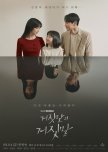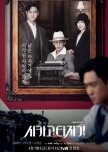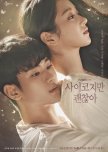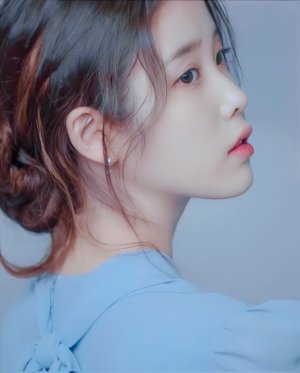
When fiction meets reality...
As a sociologist and someone from a country that went through two dictatorships, Youth of May, a drama that addresses one of the most tragic moments in South Korean history (which took place during a dictatorial period, it is important to emphasize) caught my attention.I usually believe that art in general, including dramas, has a social function, which is to remember, even what we most want to forget, because even what causes us sadness is part of the stories we experience and it is of course, the stories that make up a country and its people.
And in Youth of May it is possible to identify this effort to revive the collective memory, mixing fictional aspects and others that go back to the often cruel reality. For, against the background of the Gwangju massacre, Youth of May portrays the multiple deaths that can be experienced in traumatic events.
"Death" does not always refer to the body, but to dreams that are not lived, hopes that are dashed and reputations destroyed. Making you question what it means to live? Is a person who has given up on their dreams alive in some way or is they dying with each passing day?
That's the question I asked myself when I was introduced to the protagonists, especially Myung Hee who, for various reasons, is forced to give up her own future until finally the opportunity to leave for another place arises. But what to do, when meeting Hwang Hee Tae, our male protagonist, she finally decides to live...
Giving up a "fair" path that allowed her to live securely in sacrifice of her own happiness, Myung Hee experiences love, fear, self-pity, while questioning herself and her own values. Feelings that are interesting, as the protagonist starts to question herself and her choices, while she sees the self-control she had slip through her hands, replaced by the possibility of living a love...
Already with Hwang Hee Tae we learn somehow about remorse, about autonomy and responsibility and, in a way, submission, while he is willing to exchange his own future for the possibility of saving someone from the past, aspiration ruined for an "exchange" , who made him meet Myung Hee on a blind date. He who was willing to give up on himself found a reason not to abandon himself...
It is from this exchange that Hwang Hee Tae and Kim Myung Hee live their love, intensified by the almost instantaneous attraction and historical moment they were experiencing, as well as by the networks of relationships that tied them to a reality that cannot be defined in any way. positive. After all, the use of repression against the innocent will never cease to be regrettable.
The relationship created between the historical event, the novel presented and the other relationships demonstrated allows us to think about abstract concepts such as justice, injustice, insurgency, freedom and the false feeling of being free, as in the case of Soo Ryeon and Soo Chan's family, our secondary characters. Being Soo Chan awakened from his illusion in the final part of the work.
It is noteworthy that this symbiotic relationship (dramatized historical event + romance + family) also allows us to think about how hard reality can be. Because, through the characters, it was possible, at least for me, to somehow establish a connection with the feelings evoked and delve a little deeper into the presented historical fact.
It's as if somehow it was possible to bring, with the plot presented, an understanding even if shallow of the difficulties of those who did not have their stories told. I wonder if I'm traveling, but I got this feeling while wandering.
And finally, with the sum of the novel, with the representations (which still do not represent the full complexity of such violence) accompanied by worthy performances, the doors are opened to seek to know a little more about the true Youth of may.
Considerați utilă această recenzie?

The Princess Wei Young
22 oamenii au considerat această recenzie utilă
Framing Weiyoung
Repetitive, boring, there may not be words that better describe Princess Weiyoung. Even a story based on conspiracy, betrayal and a hint of melodrama cannot abuse an appeal in this way. Okay, the protagonist is chased, she has many enemies, but is it necessary to use the framing tactics all the time? Didn't the writers realize that the protagonist being framed almost every episode tires the viewer, even those who like "tricks"? My discontent is huge that I refuse the biggest episode 34, which was the last one I saw, sad because the story seemed promising.EDIT:
I finish the drama but my opinion remains the same
Considerați utilă această recenzie?

Această recenzie poate conține spoilere
If you want to cry, cry for kdramas...
If you want to cry, cry for kdramas ... I think this is a good phrase for those who like me are adept at melodramas (makjangs). And that is what happened to me (I cried a lot) when watching Lie After Lie, which I think is my first drama since it was aired by Channel A. Drama that from the beginning caught my attention by the casting and the plot. After all, how can you not get excited about a drama starring Lee Yoo Ri (from Father is Strange, Yellow Boots and Jang Bo laughs), Yeo Jung Hoon (who appears completely different from Mask's villain) and having Lee Ill Hwa as antagonist? I think this is almost impossible. And in addition, we have a synopsis that gives a sample of how far a mother can go, making me ask, how far can a lie take us? Is there a lie that is not entirely questionable? Is everything that we see that is established as truth really true? Questions that for me were gradually being answered with the plot of a mother who, due to her mother-in-law's selfishness and greed, had to serve the sentence for the death of her abusive, beating husband.Reading the synopsis, some may think that the drama has exaggerations, super dramatic situations, but despite any impression that the script may cause, we have scenes that are far from representing any exaggeration, because even Lee Yoo Ri's cry is painful, but at the same time, restrained and the pain is not shown through scandal, but through a facial expression that denotes through the look, a look associated with an almost shaky voice shows in a subtle way the protagonist's suffering. And this mother is joined by a father, a male protagonist who represents in an exemplary way the notions that have developed about what it means to be a man who is whole, generous and welcoming, in a non-caricatural way, because Kang Ji Min also hates, he is also upset, he also gets angry, however, all these feelings are expressed in a non-violent way, in a way that does not hurt and that demonstrates the respect he has for human beings.
We see in both protagonists a sense of justice in the terms established by that definition, more than anything, what Kang Ji Min and Ji Eun Soo seek and protect what they have most precious, that is, their daughter, without resorting disloyalty nor hurting other people. And all this fight for justice we see in 16 episodes, with an agile script. Perhaps some technical flaws and use of another cliché? Yes, but these are details ...
Considerați utilă această recenzie?

Love and Redemption
5 oamenii au considerat această recenzie utilă
Această recenzie poate conține spoilere
My heart can't forget about Love and Redemption
My heart can't forget about Love and Redemption. I think this sentence with which I start this review is the one that best describes my current state of mind, since, even though I finished this drama about a week ago, I couldn't forget it and always find myself listening to the osts and seeing random scenes (most of them impacting). To what is this my forgetfulness due? Is this due to the memorable love story told in this drama, or should I tell stories? (since we have Zi Hu and his "smelly monkey"). I must say that I am not a fanatic for xianxias, but that I watch at least some of the most cited as Legend of Fuyao, Ten Miles of Peach Blossoms, The Legends, Ashes of Love, Love and Destiny and Eternal Love of Dream, having each one these stories touched me a lot and raised my definitions of love (although I myself don't believe in such an abstract concept), but why am I bringing these dramas to my consideration?This is due to the fact that Yu Si Feng, our prota, raises the definition of devotion (yes, he is a devotee to his love for XuanJi) to a new level, which I think will hardly be reached. This devotion is demonstrated by the excellent performance of Cheng Yi, who knew how to pass us through his reactions and facial expressions as the love that makes redemption possible (pun on the name of the drama) must be. In those 59 episodes that seemed more like 16 episodes, we were able to follow how Cheng Yi and also the beautiful and competent Crystal showed a love that was planted in the Celestial Kingdom and extended for 10 lives, 9 lives marked by the apparent indifference of the incarnations of XuanJi, who immersed in anger arising from an injustice, she was unable to perceive the love that lay before her in time. A love that I think goes beyond any definition and adjectives that we have, with that I return to the protagonists that I had previously mentioned. When reviewing the scenes and stories of Ye Hua and Xufeng in particular, I was always somewhat perplexed by the delivery of each of these characters and even fell into the folly of thinking that I would never find a character who suffered as much as they did, but lo and behold I face in 2020 Yu Sifeng, who in addition to raising my standard regarding the idea of immortal love so to speak, also made me redefine my understanding of suffering.
Think about it, in 59 episodes we saw that Yu Sifeng lost his celestial status, reincarnated 10 times (in 9 he died for Xuanji or he was killed by her, that in THOUSAND YEARS), and he had to endure in his tenth life a series of injustices that resulted in a series of tortures and near-death situations, all to console Xuanji's spirit, all without support. Some of them may tend to be angry with the prota, but even though I got irritated at times, I couldn't because the INJUSTICE she suffered, the pain she had to bear was very great and besides that pain she was still treated as a criminal, as enemy of the three for just wanting a repair. Here I come to question some ideas present in the dramas. Well, as is known in the drama, we have 5 sects that, at least in theory, follow the right path, but just like in other dramas it is noticed that the very notion of the just is distorted and not only by these just sects, but also by immortals who serve as a guide for these individuals.
The notion of justice, morality, right here appears in a caricatured representation, where the actions, the motivations behind these characters do not go against what such abstract concepts should mean, because the "just" know little about what justice and righteousness, and that we see during the episodes and we have some illustrious representatives like the one I really consider as the main villain, Hao Chen / Bai Lin Dijun. And I find it interesting that even to show the meaning of evil we have a counterpoint because we see in this drama an evil in its representation, say that a little caricature (with Yuan Lang) and that evil that is not perceived, the evil disguised as morality by middle of Dijun, but I’m not going to go any further, otherwise I’ll give you crucial spoilers). Anyway, if you want to know a little more about love, hate, redemption, justice and injustice WATCH Love and Redemption !!!
Considerați utilă această recenzie?

Viața E Complicată
9 oamenii au considerat această recenzie utilă
Considerați utilă această recenzie?

Această recenzie poate conține spoilere
A short review (with some little spoilers)
Overall it's a good drama, I think it's great. I personally really liked how the protagonist handles her editor work, and the fact that she is cute most of the time, but also serious when necessary. The couple have good chemistry and the funniest scenes for me are the male protagonist being "a concubine in a cold palace".I don't know if I already said it, but one of the tags I like the most is the "hardworking female lead", that is, the protagonists who don't live in terms of romantic love. Well, love can be something important, but it bothers me a lot when some characters are defined by the relationships they have with the male protagonists.
I really liked how there is an effort to demonstrate the relationships that exist between editors and authors, as well as the distinction between "good" and "bad" editors. The emphasis given to the importance of books in general is also worth mentioning.
But there are a few things I didn't like, which I listed quickly and not so organized: 1) The way the protagonist got her job was unusual and seemed a little unrealistic, along with the fact that in her first task she took something very difficult to accomplish, which was to sign a contract for the production of the male leader's book; 2) The delay for her to know that the protagonist was her friend on the internet (wechat, I think), and the fact that he used this identity to find out more about her, seemed a little inappropriate, but nothing to stop me from continuing watching the drama; 3) The number of episodes, which could be a little smaller added to the unnecessary drama in the final part, caused in part by a female character interested in the male leader. This made the final part of the drama a bit tiring to watch, I think 30/32 episodes would be an ideal amount; 4) The relationship of the secondary ones who didn't communicate, didn't talk. The chemistry existed, that's a fact, except that the secondary couple's development was a bit boring, with misunderstandings that could be resolved with a simple serious and frank conversation.
However, these negative points were overcome by the dynamics given by the main and secondary characters. I really appreciated the effort made by the protagonist to help her writers. And finally, I'm glad that Esther Yu's acting has improved significantly.
Considerați utilă această recenzie?

Man Chang De Ji Jie
3 oamenii au considerat această recenzie utilă
The season is long, but the wait is worth it.
The Long Season is a thriller drama that aired from the end of April to the 1st of May, establishing itself as the highest rated drama (9.4) in Douban this year. But what makes this drama so special? Many answers can arise to this question. The first is that The Long Season is not a conventional suspense/thriller drama, but a drama that also deals with family, human and even social issues. The second is that the drama is composed of a narrative that, although slow, provides layers that add richness to the drama.We are introduced to a father who, together with his brother-in-law and a retired investigator, are looking for the truth about his son's death and it is in this common thread that we find the third answer to the question that starts this review, which is the ability to move between different timelines that seek to show the before/during and after the key event that guides the narrative, and also the unexpected developments that follow.
Returning to the central plot, the search for the culprit / the truth behind one or more murders is not a new theme, but, as previously mentioned, the way the plot develops in The Long Season is different, as it is similar to the plays lined up dominoes that when one is pushed overthrows the others, the plot of The Long Season develops from the investigation of a case of "hit and run" by a taxi with a false license plate, from this point on the viewer is invited to immerse yourself in the father's search for who he believes is his son's murderer going back to events in the late 90's in which the protagonist Wang Xiang was just a train driver trying to keep his job until a murder case of a young girl changes everything.
Considerați utilă această recenzie?

Această recenzie poate conține spoilere
They forgot about business and were in a triangle that didn't exist in truth
They forgot about business and were in a triangle that didn't existI don't know if the most, but maybe one of the most frustrating dramas of the year, that in script development ... A writing that started out good and ended mediocre, maybe that's a great definition for Start-Up ... I vaguely remember (and feel ashamed of) how when this drama started I indicated it to all my friends, because the first episodes were very good and an atmosphere was created that at the beginning referred to the struggle for a place in the sun (in the world business). And although I received the catfish plot strangely (lie and win / lose), I really didn't realize how harmful that plot would be.
Anyway, what should be just a subplot gained space during the dramas and unfolded in several lies, initiated by the most sympathetic character in the drama, the grandmother of Dalmi and Ji Pyeong. Lie that started with the letters, a not so smart way to deal with the suffering of a young girl when she saw her world fall apart, her world that was her family. I think that a therapy session would be much better than suspending a girl from reality and making her believe in an idealization, something that was possible because of a fanciful and somewhat naive mind for an already pre-teen. Dalmi's grandmother and JiPyeong participated in this lie, but unfortunately or fortunately, this lie gained a certain amount of truth, as they both felt comforted by it.
Behold, here comes the second and third lies, the second is that the card boy was the first love, a boy who was a creation but who also had part of the male secondary dreams / drawings, but as a character if you love can you love someone? This is Dalmi, who grew up cultivating a dream and speaking words that she barely knows the meaning of, love is a very strong word and not everyone deserves to say it. The third lie is Nam Do San, who started as a character that made identification possible, but developed in the opposite direction, lying and being aggressive, a protagonist with flaws, I think the idea of trying to break with the concept of protagonist is a good point perfect, but we were faced with too many failures and almost unjustifiable mistakes. So we have the fourth lie, which is to get Nam Do San into Dalmi's life, a person who had nothing to do with the history of the letters, but who destroyed his memories with his hands (that was the funniest line that read in a script). With that, Do San enters Dalmi and Ji Pyeong's life and the romance begins ...
I mean the "frustrating triangle begins". And the lie becomes more accompanied by mistakes, "mistakes" made to keep the audience and the audience engaged in the dispute for couples, which only brought prejudice to the drama and left it tiring. The catfish that should have lasted only 4 episodes (in a sensible script) took 8 episodes to finish, and was also accompanied by episodes of regrets, cries and a Dalmi confused only in words because the actions already showed the decision she had made, although there is a lack of coherent reasons beyond what she said to Do San regarding her feelings for him, in this sense you can understand Do San's insecurity, which is plagued by an imposter syndrome (although he talks about freedom, he navigates without a plan and sometimes be violent, atypical). In some novels at the moment of confession, we always have that old cliché phrase of "Because it's you" and its similars, which may seem in the mind of some as something creative, but it only shows a poverty of writing, remembering that during those moments we always had an attempt to keep a viewer stuck in the drama.
But let's discuss other errors in the script. If this frustrating triangle were not enough, the brilliant plot of revenge for suicide is inserted. What made me more frustrating, because in addition to making the plot tiring, he showed immense carelessness in dealing with such a sensitive topic and also responsibility. This is supposed to bring about a change in the character Han Ji Pyeong seen as rude (things of those who do not know the business world or have never worked under pressure) by telling hard truths, but which in reality only served to keep him from the central stage. Now, if the secondary was removed, why only define the couple in episode 15? I repeat, just to hold the audience and generate repercussions, although most of them were negative and hindered the unfolding of the story, because it is because of revenge (and also because Nam Do San jealously, Chul San Greedy) that one of the worst decisions is made, we see the dissolution of the Samsan Tech team, unjustified violence (fight between Nam Do San and Ji Pyeong), tears and more tears, in short, unnecessary things. The interesting thing is that at this point all the words spoken in mentoring and previously in the drama, most of them by JP made sense, that emotionally unprepared developers wanted to be what they were not, that is, entrepreneurs, ceos ...
And what about the letters? They were forgotten for the longest time, proving that Dalmi's "first love" was just one of his many illusions, having a closing scene of that pathetic plot in the final episode.
What about grandma? One of the most important characters has been forgotten, just the initiator of the cards and the one who has a connection with almost all subplots. But before that, she gets a disease and here we see Do San's kindness being demonstrated, creating a non-profit business just for "kindness". And Injae? She only appeared on the posters and served more than half as Dalmi's "final enemy" by speaking unpleasant words, being defeated and remembered for her mistake in not choosing her sister and father. At least, she is with her sister, although we don't know how we already had a 3-year skip team (which has led to almost no development in history other than making Samsan's 3 rich and this reconciliation). The interesting thing is that it was supposed to be the female secondary, it was reduced to almost an extra and in most of the drama it had less relevance than her own mother, having as one of her main actions the lie of the Sandbox (in which she pretended to be the sister, that served as an idea for the creation of this support program for start-us) and serve as one of the catalysts for the rapprochement of Dalmi and Nam Do.
And finally, about Ji Pyeong? The best-built character lost to the poster boy (the name by which an influencer I know called Wes calls the protagonist). He became a supporting actor in his own story and ended as he started, that is, alone, having nobody but his grandmother, because I honestly cannot consider Dalmi, Do San, Chul San, Yong San to be good companies.
Finally, I need to score something. I heard that this story of starting in high school was an attempt to subvert the idea of first love and give a narrative turn? But what first love? what turn? What I saw was just one mistake followed by another ...
Considerați utilă această recenzie?

Chicago Typewriter
0 oamenii au considerat această recenzie utilă
Această recenzie poate conține spoilere
Friendship and love in two lives? This is Chicago
Here I will organize in a not very organized way some considerations I made about Chicago:1. I was very doubtful about what grade to give to the drama. I was between 9 / 9.5
2. Why the romantic plot it is interesting because it addresses the idea of reincarnation, but it did not captivate me as much as the friendships between the main characters, for example.
3. Mainly Shin Yul's friendship with Se Ju in both lives
4. In relation to the two lives, I liked the one from 1930 more, not only because it touches on an important historical moment and movement for the history of Korea, but I thought that the relationships were better explored / developed, despite actually deepening in the last 6 episodes.
5. So much so that for me the depth of the couple's romance is the previous life, that I can get into this concept of tragic love / destiny. Depth that I think was lacking in 2017
6. Despite being a possible demerit for drama, this factor shows a little of the talent of the main actors for embodying different characters so well
7.Regarding character, my favorite even with what happened, the so-called betrayal, continued to be Shin Yul / Jin-o, because it was not something intentional, nor involving malice, he did it for no other reason than despair. What somehow destroyed him is clear when he does not show any reaction to death, as he had already died inside. The greatest proof of his regret was the more than 80 years he waited to redeem himself, which he did.
Considerați utilă această recenzie?

E Nebună, Dar E-a Mea
9 oamenii au considerat această recenzie utilă
Această recenzie poate conține spoilere
Search for feelings
Not having feelings or not knowing that you have them? It was this question that I asked myself when I heard Gang-Tae's speech about Mun-Yeong's supposed lack of feelings. I believe that many people know that for healthy development, as healthy I include good mental health, it is necessary to grow up in an environment that provides this, but that did not happen with the main character of this drama. Aware of this, can we say that she has no feelings or that the set of situations she experienced made her an emotional mess? Mess she shows in her actions that look more like a cry for help ...I think that the discovery of feelings, as well as the healing of the main characters' traumas, is a point as or more important than the possible romance. For like Mun-Yeong, Gang Tae also needs help, only he hasn't realized it until now.
To show this "search", I believe that the choice of how the narrative is shown is interesting, as well as the references to Tim Burton's style. Representing the feelings, desires and aspects of the characters' lives from the fairy tales written by Mun-Yeong besides enchanting also allows a greater immersion of the spectators, as it is a creative way of seeing reality ...
Considerați utilă această recenzie?























